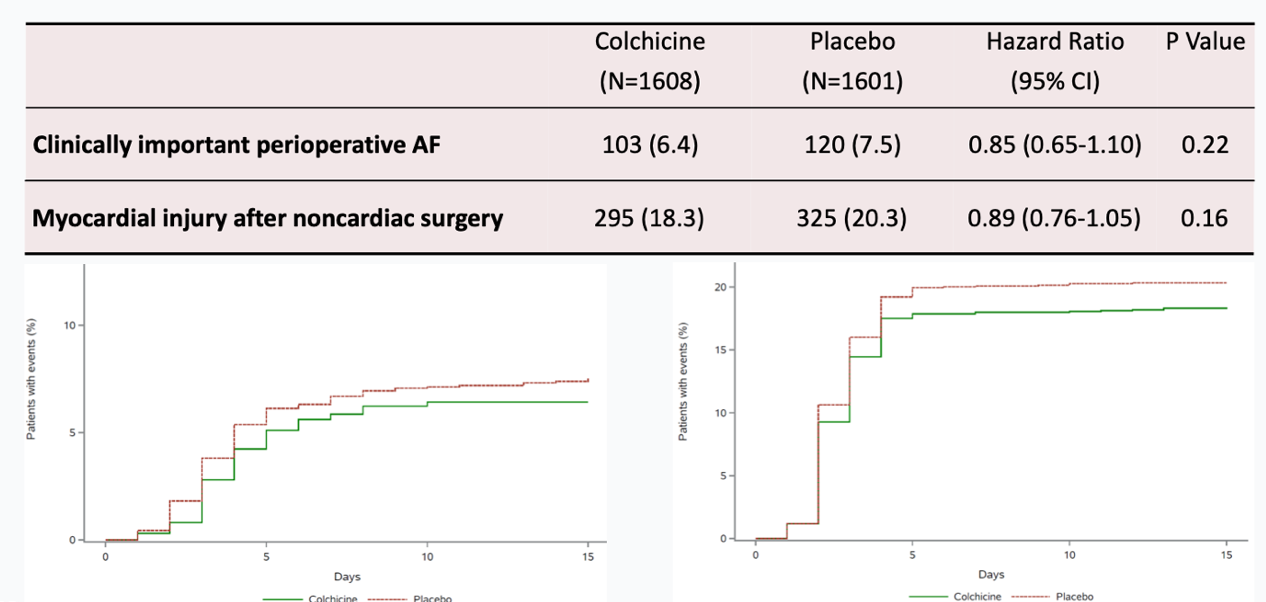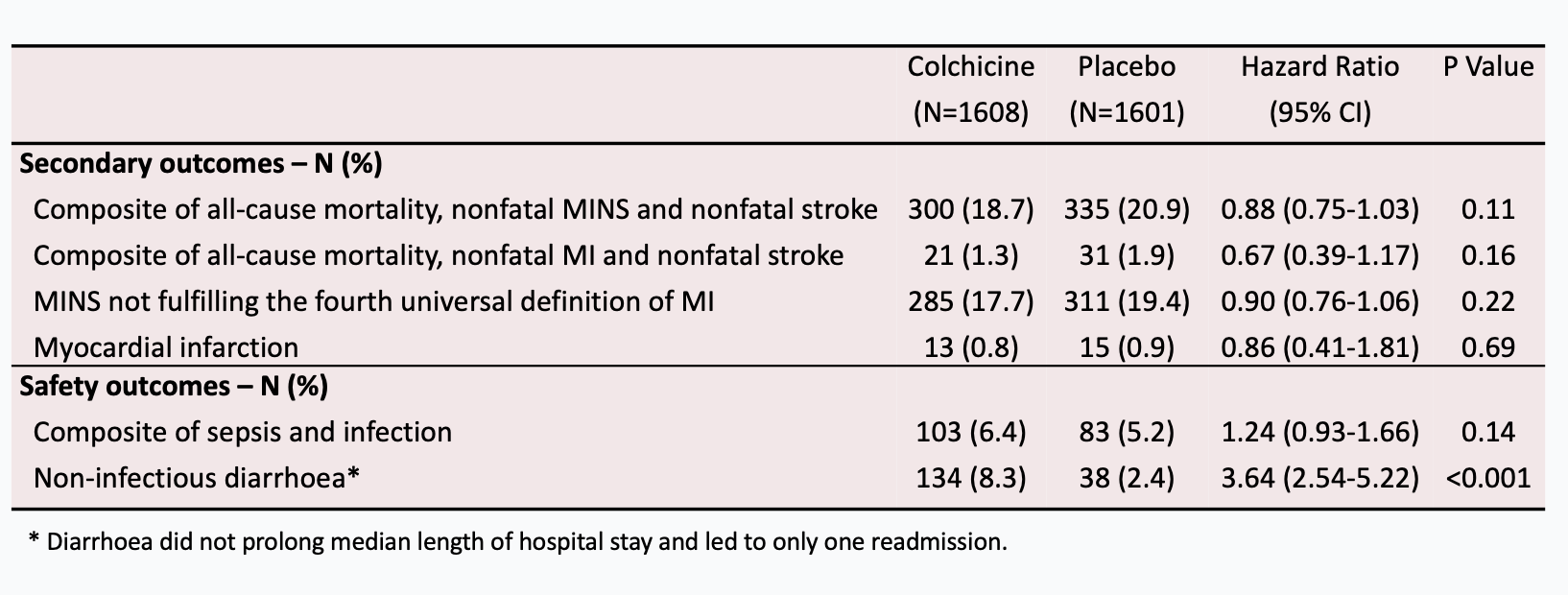
王东进 潘沱
南京大学医学院附属鼓楼医院
2023年欧洲心脏病学会(ESC)来自全世界心血管病界的专家云集。秋水仙碱的应用是近年来心血管病界的研究热点。此次会议中,关于秋水仙碱与术后房颤的研究再次成为热点话题之一。
心胸外科手术过程中,常会引起生理变化,包括内皮细胞、白细胞、血小板、补体系统和凝血的级联激活[1-4]。尤其是术中患者的中性粒细胞常被,如:补体、炎性细胞因子(IL-6、IL-8)、凝血酶、ROS和内毒素等促炎介质激活[5]。活化的中性粒细胞会浸润心肌,并导致严重的心肌缺血-再灌注损伤,最终明显增加患者在院死亡率[6]。此外,系统性的中性粒细胞激活,可导致中性粒细胞在心肌内蓄积,造成微血栓形成和内皮功能障碍,导致术后房颤发生率高达10%[7],而术后心房颤动可显著增加患者的ICU住院时间,并增加患者围手术期神经系统不良事件发生率[8]。
为了抵消心胸外科手术过程中的炎症反应危害,围术期使用抗炎药物已成为一种非常有前途的治疗方法。近期,发表在European Heart Journal及Circulation上的高水平临床研究报道,在心脏手术围术期使用糖皮质激素可以减轻炎症,并降低患者炎症相关器官损害的发生率[9,10]。但糖皮质激素这样的广谱抗炎药物的应用,往往可能会增加患者感染、高血糖、术后呼吸机时间延长、肾功能衰竭等不良事件的发生率[9]。为寻找更好的抗炎性损伤药物,New England Journal of Medicine 、Circulation、JACC 等国际知名杂志上报道:秋水仙碱可通过抗中性粒细胞趋化、黏附,降低中性粒细胞活性,从而降低机体炎症反应,有效降低冠心病患者的全因死亡率,并延长他们的生存时间[11-14]。在心脏外科领域,王东进教授团队及其他国外团队通过高质量RCT研究证明:秋水仙碱可显著降低心脏手术患者的围术期心肌损伤[15,16],降低心脏手术患者围术期心包切开综合征发生率[17],降低心脏术后房颤发生率[18]。
由于前期多项研究已证明,秋水仙碱可有效降低心脏手术围术期心肌损伤(MINS)、房颤(AF)发生率[15,16,18-21]。因此,在非心脏手术的其他普胸手术病人中,秋水仙碱是否可以降低围术期心肌损伤、房颤发生率是非常值得研究的科学问题。本次会议中来以David Cone教授为代表的加拿大、瑞士、中国香港等国家与地区的多中心研究团队证明:在非心脏手术的普胸外科手术病人中,秋水仙碱不仅没有降低患者MINS及AF的发生率(图1),反而还增加了患者非感染性腹泻发生率。

图1:与安慰剂组相比,秋水仙碱没有降低患者MINS及AF的发生率
据David Cone教授介绍,该多中心、随机、对照研究的受试者来源于11个国家的45个医学中心,共3209例接受非心脏手术的普胸外科患者中,1608例患者接受了秋水仙碱治疗(术前4小时,术后连续10天,0.5mg bid),1601例患者等剂量、等时间服用了安慰剂,随访时间为14天;秋水仙碱组与安慰剂组,AF、MINS、全因死亡率、中风、心梗、感染等并发症无统计学差异;与安慰剂组相比,非感染性腹泻秋水仙碱组明显增高(图2)。

图2: AF、MINS、全因死亡率、中风、心梗、感染等并发症无统计学差异
点评
在心胸外科患者中,已有高质量研究证明:小剂量秋水仙碱可有效降低心脏手术患者围术期心肌损伤、心包切开综合征、术后房颤发生率。但非心脏手术的普胸外科病人,秋水仙碱是否可以降低围术期心肌损伤、术后房颤尚无定论。该研究填补这一领域的空白,并证明:秋水仙碱不仅没有降低患者MINS及AF的发生率(图1),而且还增加了患者非感染性腹泻发生率。这一负性结论,无疑给秋水仙碱在普胸外科手术患者的应用泼了一盆冷水。
但该研究存在以下几点问题:
(1)我们目前秋水仙碱的应用时间为,术前2-3天0.5mg QD联合术后连续5-10天0.5mg QD,该剂量目前在国内外尚有争议。秋水仙碱的平均半衰期为20小时,因此术前数天使用小剂量秋水仙碱可更加有效地产生围术期抗炎作用。该研究中术前4小时才服用秋水仙碱,可能无法有效抵御术中炎症反应。(2)该研究中秋水仙碱剂量为0.5mg BID,并有8.3%的病人发生腹泻。在我们的研究中,我们观察到即使使用0.5mg QD这一剂量,依然会有5%的患者发生腹泻。这说明0.5mg BID或许过高,对于中国病人来说,可能会导致较为严重的腹泻,我们对该研究中的采取的0.5mg BID这一剂量,持保留态度;(3)秋水仙碱可有效抑制中性粒细胞相关的炎症风暴,急性呼吸窘迫(ARDS)与中性粒细胞炎性风暴密切相关。普胸手术过程中,由于频繁触碰、位移肺脏高发ARDS,该研究对ARDS或急性肺损伤(ALI)并未报道,后续的研究中可观察ALI、ARDS发生率,可能会有新的发现;(4)该研究中秋水仙碱连续服用10天,秋水仙碱在中性粒细胞的药物浓度高于血药浓度可维持10天之久。但该研究的随访时间仅有14天,可能会遗漏一些炎症相关变量的变化,如白介素,降钙素,C反应蛋白等。
总之,该研究填补了目前普胸外科领域,关于秋水仙碱应用的空白。未来针对这一领域的病人,应持更加谨慎的态度应用秋水仙碱。但本研究尚存一些值得推敲的问题,未来的研究应从更多角度思考秋水仙碱的有效性和安全性。
参考文献:
向上滑动阅览